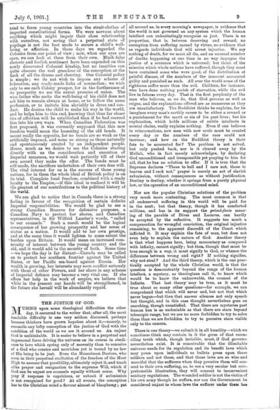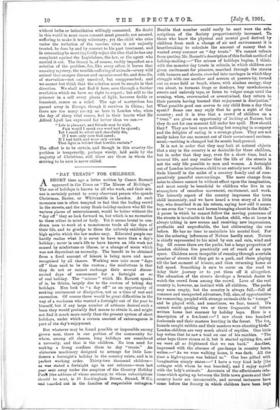THE JUSTICE OF GOD.
MUSING upon some theological difficulties the other day, it occurred to the writer that, after all, the most insoluble difficulty is one very seldom discussed, perhaps because thinkers have grown hopeless about it—namely, to reconcile any lofty conception of the justice of God with the condition of the world as we see it around us. An unjust God is unthinkable. It is easier to believe in a perpetual and impersonal force driving the universe on its course in obedi- ence to laws which spring only of necessity than to conceive of a God who creates and nourishes yet is bound by no law of His being to be just. Even the Mussulman Doctors, who seem in their perpetual exaltation of the freedom of the Most High to assume that possibility, ultimately reject it, and teach alike prayer and resignation to the supreme Will, which if God can be unjust are counsels equally without sense. Why pray if response is capricious, or submit if submission is not recognised for good P At all events, the conception has to the Christian mind a flavour almost of blasphemy ; yet
all around us, in every morning's newspaper, is evidence that the world is not governed on any system which the human intellect can unhesitatingly recognise as just. There is no proportion, that is, between deserving and reward, no exemption from suffering earned by virtue, no evidence that as regards individuals God will arrest injustice. We say nothing of death, for we must all die, and an unusual number of deaths happening at one time in no way impugns the justice of a sentence which is universal; but think of the miseries which whole nations have suffered, though they must have contained some who were good, of the distribution of painful disease, of the numbers of the innocent accounted guilty and punished as such. All over the world some of the righteous suffer more than the evil. Children, for instance, who have done nothing perish of starvation, while the evil live in fatness every day. That is the first perplexity of the man who believes, as we do, that God governs as well as reigns, and the explanations offered are as numerous as they are unsatisfactory. The Buddhist thinks he explains, for he imagines every man's earthly career to be either a reward or a punishment for the merit or sin of his past lives; but his explanation, which holds millions of subtle intellects in mental chains, really explains nothing. Even if one believes in reincarnations, new men with new souls must be created every day or the numbers of the race could not increase; and how on the Buddhist theory is their fate to be accounted for P The problem is not solved, but only pushed back, nor is it cleared away by the Mullah, who in fact merely acknowledges, by declaring God unconditioned and irresponsible yet praying to him for aid, that he has no solution to offer. If it is true that the Supreme declares " These to hell and I care not, those to heaven and I reek not," prayer is merely an act of slavish submission, without consequences as without justification. Destiny is destiny, whether it springs from a purely physical law, or the operation of an unconditioned mind.
Nor are the popular Christian solutions of the problem very much more contenting. The most common is that all undeserved suffering in this world will be paid for in the next ; but that theory, though it has comforted millions, and has in its support the prima-facie mean- ing of the parable of Dives and Lazarus, can hardly be accepted by the reflective. It suggests too much a compensation for wrongful conviction, the original injustice remaining, to the apparent discredit of the Court which inflicted it. It may explain the fate of man, but does not even help to explain the nature of God. Another theory is that what happens here, being momentary as compared with infinity, cannot signify ; but then, though that must be true enough in a way, it must signify to God, or whence the difference between wrong and right P If nothing signifies, why not steal P And the third theory, which is the one prac- tically accepted by the whole Christian world, is that the question is demonstrably beyond the range of the human intellect, a mystery, as theologians call it, to know which would be to know the unknowable, the counsel of the Infinite.. That last theory' may be true, as it must be true about so many other questions—for example, we can comprehend that which will never end, but not that which never began—but then that answer silences not only speech but thought, and in this case thought nevertheless goes on searcl'ing, though unsatisfied. That there are mysteries past human ken is as undeniable as that there are stars beyond telescopic range, but we are no more forbidden to try to solve them than we are forbidden to try to perceive stars visible only to the camera.
There is one theory—we submit it in all humility—which we sometimes think may contain in it the germ of that recon- ciling truth which, though invisible, must, if God governs, nevertheless exist. It is conceivable that the illimitable universe needs for its regulation and its benefit laws which may press upon individuals as bullets press upon these soldiers and not those, and that those laws are so wise and merciful that the sufferers when they perceive them will con- sent to their own suffering, as, to use a very secular but com- prehensible illustration, they will consent to inconvenient sanitary regulations. The wounded soldier is not the victim of his own army though he suffers, nor can the Government be considered unjust to whose laws the sufferer under them has
without bribe or intimidation willingly consented. No doubt in this world in most cases consent must precede, not succeed, suffering to make it truly voluntary; yet the child who cries under the irritation of the vaccine virus is not unjustly treated, he does by and by consent to his past treatment, and in consenting be must implicitly reject the idea that he has any complaint against the Legislature, the law, or the agent who carried it out. The theory is, of course, visibly imperfect as a solution of the problem, for, like every other, it leaves that amazing mystery, the terrible suffering of animals—every wild animal that escapes disease and enemies must die. and does die, of starvation—not only unsolved, but unapproached ; and we cannot but think that the solution must be sought in that direction. We shall not find it here, save through a further revelation which we have no right to expect ; but still to the prisoner in a cell every gleam of light, however feeble or transient, comes as a relief. The age of martyrdom has passed away in Europe, though it survives in China ; but there are too many amcng us here in London who, when the day of sharp trial comes, feel in their hearth what Sir Alfred Lyall has expressed far better than we can :— " Life is pleasant, and friends may be nigh, Fain would I speak one word and be spared ;
Yet I could be silent and cheerfully die, If I were only sure God cared ;
If I bad faith and were only certain That light is behind that terrible curtain."
The effort is to be certain, and though in this country the problem is temporarily, perhaps wisely, laid aside by the majority of Christians, still there are those in whom the striving to be sure is never stilled.



















































 Previous page
Previous page